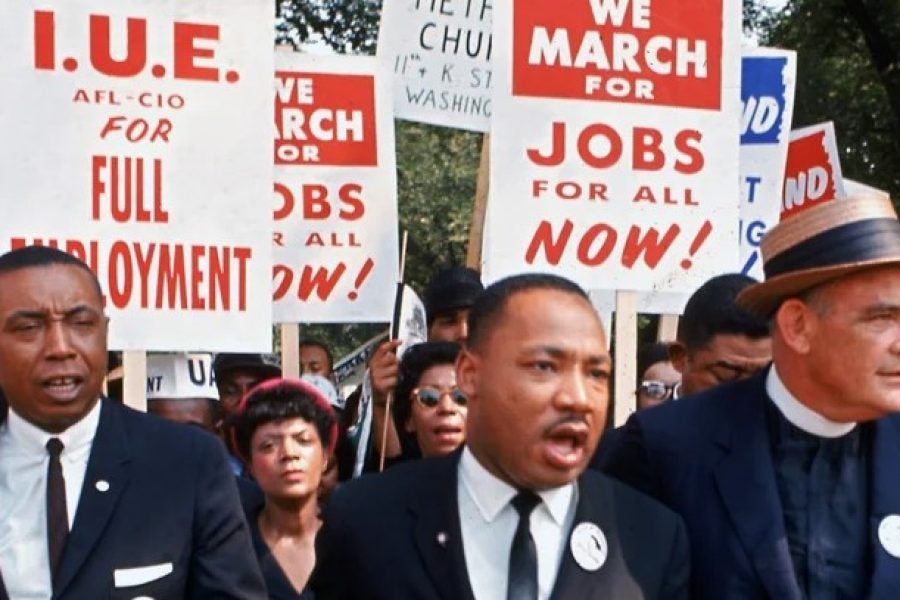
Although a less-quoted aspect of his legacy, the Rev. Dr. Martin Luther King Jr. centered economic justice as a core tenet in his fight for liberation. In fact, he died while advocating for the safety, fair wages and equitable benefits of Black sanitation workers in Memphis. Central to his Poor People’s Campaign, he knew true freedom lay in pairing civil rights with just economic policies and practices. This fight persists today.
As we commemorate Dr. King’s impact, we must elevate his message that political and economic power are equally integral elements of an inclusive, more just society. That’s a central idea of Demos’ work for economic democracy. To build power for Black people, we have to break up and regulate corporate power that grew out of a system of racialized capitalism and continues to have outsized benefits and unfair influence. To truly meet the needs of all people across the country, we have to expand our understanding of public goods and ensure essential services like broadband internet, childcare and education are equitably distributed. And if people are to truly have a say in our democratic processes, we must embrace co-governance models that enable people and public agencies to make decisions collectively about their local economy.
Nationally, today’s fight for economic justice is not just pushing for the legislation we need,; we must also ensure its equitable implementation. For example, we’re continuing to work for equitable distribution of funding in the Inflation Reduction Act and for what it failed to include: essential and broadly popular programs like Universal pre-K, the Child Tax Credit, and meaningful investments in affordable housing and healthcare. It also is re-introducing and pass the PRO Act, which would protect and expand the right for workers to organize. And it means holding corporations accountable that leverage their power to monopolize markets, privatize public services, and lobby against popular investments—all to the detriment of Black and brown communities.
Often when national fights are stalled, our partners in the racial justice movement lead the way to bring tangible change to our local communities. The Our Water Campaign in Pittsburgh won back public control of their water and a seat at the table to prevent future privatization of this critical utility. In Houston, the Texas Organizing Project worked to elect a new county commissioner to have a say in the distribution of disaster relief funds and is training the next generation of Black and brown elected officials. In New York, the Public Bank NYC coalition has led the fight for a public bank that would help address the harms that private financial institutions have long inflicted on Black and brown communities that have widened the racial wealth gap.
The need for justice in our economy is more urgent than ever. White supremacy and violent anti-democratic movements are gaining ground in the United States and abroad. Far-right extremists have already begun wreaking havoc in the House of Representatives. They aim to use their power to thwart any policies that will lift working people, such as expanding voting rights, increasing worker protections and protecting access to reproductive healthcare. We know this will disproportionately impact Black and brown people, and we must be just as ready to fight back.
We are already seeing the effects of building power in Black and brown communities play out with significant progressive wins across the country and historic engagement among voters of color. In the 2022 elections, voters passed pro-people policies nationwide, including eliminating the tipped wage for restaurant workers in Washington, D.C., expanding Medicaid in South Dakota, removing slavery as punishment from the constitution in Tennessee, and codifying abortion in five states. Nebraska and Nevada voters approved measures to increase the state minimum wage. This is the kind of economic justice we can realize when our communities lead.
Even with these victories, there is much work to do. Our opposition is organized, strategic, and well-funded. Those trying to rip at the threads of our constitutional fabric are more emboldened than ever to undermine and dismantle the steps toward justice for communities of color set in motion by Dr. King and his partners in that civil rights era. However, these recent wins—even in the face of significant new obstacles to voting—show that our communities have the power, the knowledge, and the will to fight back.
The threats against our freedom are real, but we can overcome them by advancing inclusive, pro-democracy policies, enacting regulations on corporate power that exploit communities of color and building a just economy through increased political and economic power. Or, as Dr. King would say, “We’ve got to give ourselves to this struggle until the end. Nothing would be more tragic than to stop at this point… We’ve got to see it through.”
We press on.
Taifa Smith Butler is the President and CEO of Dēmos, a racial justice think tank. Through research, advocacy, strategic communications, litigation, and deep partnerships with grassroots organizations across the country, Dēmos works to build power for Black and brown communities.







